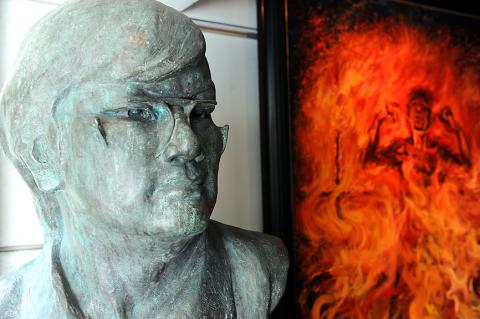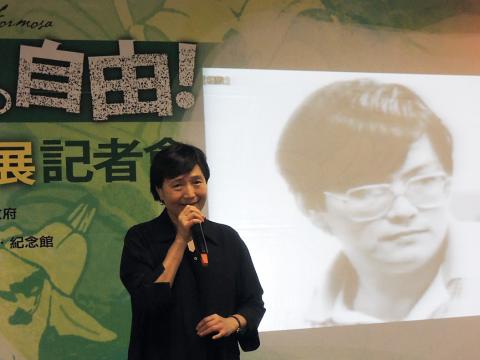The widow of democracy activist Deng Nan-jung (鄭南榕) and politicians yesterday lambasted a decision by National Cheng Kung University overruling the student body’s plan to name a plaza on campus “Nan-jung Square” (South Banyan Square, 南榕廣場) because of the name’s “political connotation.”
The university’s School Affairs Committee voted 70-21 on Wednesday in favor of not naming the area.
In a student poll last month on naming the area, Nan-jung Square drew the largest number of votes — in honor of Deng, an alumnus, and the banyan tree, the school’s symbol.

Photo: Chang Chia-ming, Taipei Times
However, university president Hwung Hwung-hweng (黃煌煇) wrote an open letter to the faculty and student body on Jan. 2, citing Article 6 of the Education Basic Act (教育基本法) and saying the name was inappropriate.
Hwang said the school needed to remain politically and religiously neutral.
On April 7, 1989, Deng, the 43-year-old publisher of the Freedom Era Weekly magazine, set himself on fire in his office in defense of the freedom of expression. Police had tried to arrest him for printing a proposal for a constitution for the Republic of Taiwan in the magazine. His suicide ended a 71-day standoff after he locked himself inside the office.

Photo: Wang Jung-hsiang, Taipei Times
Democratic Progressive Party (DPP) Chairman Su Tseng-chang (蘇貞昌) said on Facebook yesterday that the overruling of the vote by a majority of the student body was the worst example of democratic education.
“The school should be more open-minded about the result of the vote and implement the name. It would have been the best resolution to the issue,” Su wrote.
“Deng gave his life so that full freedom of speech would one day become a reality, and his sacrifice has had a great impact on Taiwan’s struggle for democracy,” Su said.
It was sad that the university overruled a democratic decision due to concerns that the name might have “political connotations,” Su said.
During the committee’s meeting on Wednesday — which was open to all students — history professor Wang Wen-hsia (王文霞) said Deng’s choice of suicide was inappropriate and compared the act to Islamist suicide bombers.
She said Deng should have used another method to overcome his difficulties.
Deng’s widow and former Presidential Office secretary-general Yeh Chu-lan (葉菊蘭) was outraged by Wang’s comment.
“My heart bled,” Yeh said, adding that it was like reopening old wounds for the family.
Yeh said Wang was a disgrace to the nation’s education system, adding that she would demand a public apology.
Wang later said that she respected Deng’s efforts to promote Taiwanese democracy and respected both Deng and his family, but that she simply did not agree with the method he used.
“Self-immolation is an overtly radical method; the spirit of democracy and liberty is respect for life, not hurting onself or others,” Wang said.
Wang’s explanation failed to pacify her critics, with former DPP chairperson Shih Ming-te (施明德) saying he never thought that the university would have such professors.
“How can a person who cannot tell right from wrong teach students,” Shih told reporters at a press conference.
He added that if Taiwanese could accept and honor the sacrifice of the 72 Martyrs of Huanghuagang (黃花崗), they should be able to accept a local martyr like Deng.
New Taiwan Humanities Research Foundation chief executive Huang Hui-chun (黃惠君) said that Deng had sacrificed his life in pursuit of democracy.
“Deng’s self-immolation caused no fear in society. How can he compared to suicide bombers?” Huang said.
Lin Yi-ying (林易瑩), former head of the university’s student club 02 Group (零貳社) — whose name is a phonetic translation of “protest” in Hoklo (commonly known as Taiwanese) — said on Wednesday that the committee’s decision trampled on the democracy of the student body.
The Joint Association of Student Clubs at the university said that they had done all they could and had accepted the committee’s decision.
Huang said it did not really matter what the official name of the area on campus is called. For instance, some people call the National Chang Kai-shek Memorial Hall by other names, such as the Chungcheng Temple, he said.
“Everyone can use a name they want to call the plaza; they can even name it after me,” he said.
Additional reporting by staff writer

CARROT AND STICK: While unrelenting in its military threats, China attracted nearly 40,000 Taiwanese to over 400 business events last year Nearly 40,000 Taiwanese last year joined industry events in China, such as conferences and trade fairs, supported by the Chinese government, a study showed yesterday, as Beijing ramps up a charm offensive toward Taipei alongside military pressure. China has long taken a carrot-and-stick approach to Taiwan, threatening it with the prospect of military action while reaching out to those it believes are amenable to Beijing’s point of view. Taiwanese security officials are wary of what they see as Beijing’s influence campaigns to sway public opinion after Taipei and Beijing gradually resumed travel links halted by the COVID-19 pandemic, but the scale of

TRADE: A mandatory declaration of origin for manufactured goods bound for the US is to take effect on May 7 to block China from exploiting Taiwan’s trade channels All products manufactured in Taiwan and exported to the US must include a signed declaration of origin starting on May 7, the Bureau of Foreign Trade announced yesterday. US President Donald Trump on April 2 imposed a 32 percent tariff on imports from Taiwan, but one week later announced a 90-day pause on its implementation. However, a universal 10 percent tariff was immediately applied to most imports from around the world. On April 12, the Trump administration further exempted computers, smartphones and semiconductors from the new tariffs. In response, President William Lai’s (賴清德) administration has introduced a series of countermeasures to support affected

MORE VISITORS: The Tourism Administration said that it is seeing positive prospects in its efforts to expand the tourism market in North America and Europe Taiwan has been ranked as the cheapest place in the world to travel to this year, based on a list recommended by NerdWallet. The San Francisco-based personal finance company said that Taiwan topped the list of 16 nations it chose for budget travelers because US tourists do not need visas and travelers can easily have a good meal for less than US$10. A bus ride in Taipei costs just under US$0.50, while subway rides start at US$0.60, the firm said, adding that public transportation in Taiwan is easy to navigate. The firm also called Taiwan a “food lover’s paradise,” citing inexpensive breakfast stalls

Pope Francis is be laid to rest on Saturday after lying in state for three days in St Peter’s Basilica, where the faithful are expected to flock to pay their respects to history’s first Latin American pontiff. The cardinals met yesterday in the Vatican’s synod hall to chart the next steps before a conclave begins to choose Francis’ successor, as condolences poured in from around the world. According to current norms, the conclave must begin between May 5 and 10. The cardinals set the funeral for Saturday at 10am in St Peter’s Square, to be celebrated by the dean of the College